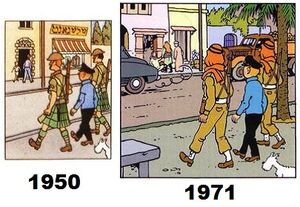Template:Black Gold Template:Book Infobox Land of Black Gold is the fifteenth of The Adventures of Tintin. It was first published in Le Petit Vingtième from 1939 to 1940, but ended in mid-adventure. It was later redrawn, colourised and published in the Tintin Magazine and in book form from 1948 to 1950. Both these versions were set in the British Mandate of Palestine. In 1971 parts of the story were again redrawn in order to set it in the fictional state of Khemed.
Synopsis
All over the country motor vehicle engines are spontaneously exploding. The cause for this is narrowed down to the type of petrol used in the cars which had been tampered with in order to cause such an explosion. As a result most form of transportation from cars to aeroplanes are reducing their fuel usage, thus affecting the economy.Additionally political pressures are intensifying, placing the world on the brink of war, and Captain Haddock is mobilised in expectance of such an outbreak of hostilities. After following different leads, Tintin and Thomson and Thompson set off for Khemed on board a petrol tanker. Upon their arrival, the three are framed and arrested by local police. The Thompsons are found with heroin in their cabin while Tintin was found in possession of serious documents concerning the rebel leader, Sheik Bab El Ehr. The Thompsons are cleared and freed, but Tintin is abducted by Arab guerrillas. In the original version of the story he initially arrived in the port of Haifa in British Palestine and was first captured by members of the Irgun, before being abducted by Arabs subsequently.During these experiences, Tintin re-encounters his old enemy, Dr. J.W. Müller from The Black Island, whom he discovers is responsible for sabotaging the oil pipelines. He reunites with the Thompsons and finally arrives in Wadesdah, the capital city of Khemed, where he comes across his old friend, the Portuguese merchant Senhor Oliveira de Figueira. When the Emir of Khemed Mohammed ben Kalish Ezab's young son, the Crown Prince Abdullah, is kidnapped, Tintin suspects that Müller, working under the name of “Professor Smith,” is responsible. He chases Müller with hopes of saving the prince. In the process he discovers Müller to be an agent of a foreign power, and that he is indeed responsible for the tampering of the fuel supplies.Doctor Müller had devised a unique type of chemical in a tablet form that intensifies the explosion power of crude oil by a considerably. The Thompsons find some of the tablets and swallow them, thinking them to be aspirin. This causes them to continuously burp, hiccup and grow long hair and beards that constantly change colour. After studying the tablets, Professor Calculus comes up with remedies for the Thompsons as well as a countering agent to the affected oil supplies, though, in the process of carrying out these tests, he half-destroys Captain Haddock's estate; Marlinspike Hall, earning his understandable ingratitude.
Versions

Two different versions of the same scene. The original had British troops which was redrawn to have Arab police later on.
The original version was set in the late 1930s in the British Mandate for Palestine and the conflict between Jews, Arabs and British troops. Following the takeover of Belgium by Germany in 1940, Hergé decided that it would be wiser to drop this story whose political context would not have appealed to the German censors. It ceased publication at about mid-adventure when Tintin, after his first confrontation with Müller, is caught in a sandstorm.
Hergé restarted the story from scratch in the Tintin magazine in 1948. It was redrawn, colourised and given more detailed panels,however the scenes with the British troops, Arabs and Jews remained. By now Captain Haddock had become an important part of the Tintin world and he was therefore added to the conclusion of the story (although no explanation as to how he suddenly turns up to rescue Tintin in Müller's bunker is given). Nestor makes a cameo and Cuthbert Calculus and Marlinspike Hall are both mentioned.
Two decades later when the story was due to be published in English the modern state of Israel had long been established. Methuen felt that the scenes of British troops in Palestine made the book dated. Hergé and his assistant Bob de Moor rewrote the album resetting the story in a fictional Arab state called Khemed. It was published in 1972 and it is this version that is most commonly available in most countries today.
Appearances
Characters
- Tintin
- Snowy
- Captain Haddock
- Thompson and Thomson
- J.W. Müller
- Mohammed Ben Kalish Ezab
- Abdullah
- Bab El Ehr
- Oliveira de Figueira
- Ali Ben Mahmud
- Yussuf Ben Mulfrid
- Jock McPhee
- Ahmed
- Colonel Mohammed
- Murad
- Abdul
- Daud
- Jebb
- Vic
- Professor Biggams
- Achmed
- Yamato
- Ben Yussef
- Nestor
- Cuthbert Calculus (mentioned)
Previous Editions
Locations
Previous Editions
Organizations
| The Adventures of Tintin | ||
|
LS | TC | TA | CP | BL | BE | BI | KO | CG | SS | SU | RR | SC | PS | LB | DM | EM | CA | RS | TT | CE | FS | TP | AA | guide to abbreviations |
